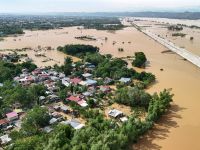A senior adviser to United States Secretary of Defense Donald Rumsfeld indicated that war with Iraq was probable even if Baghdad backs down and permits UN inspectors back in to its country to hunt for weapons of mass destruction.
"I don't think there's anything Saddam Hussein could do that would convince us there's no longer any danger coming from Iraq," stated Richard Perle, Head of the Defense Policy Board of the U.S. Department of Defense and a top Rumsfeld adviser.
In an interview with the German edition of the Financial Times made with Perle at the Munich Security Conference, the latter said the only thing that would persuade Washington regarding Iraq would be a change of regime.
U.S. President George W. Bush was now on "a very clear path" heading towards war with Iraq, said Perle as quoted by the Financial Times Deutschland.
The newspaper said that if Perle’s remarks were accurate, even Iraq's meeting the U.S. demand for the return of international inspectors would do nothing to prevent future American military strikes.
Furthermore, Perle said Afghanistan was a possible model for a war with Iraq. Such a scenario would include immense US air strikes on Iraq, special operations units on the ground and the use of domestic opposition groups to carry the main burden of the ground war.
"The potential fighting forces would be Kurds in the north and the Shias in the south," he explained.
A leadership structure could be the Iraqi National Congress (INC), he added. The INC has long been regarded as weak and divided, the Financial Times Deutschland mentioned.
Perle repeated the notion expressed by American officials at the Conference that Washington was concerned over European opposition to a war with Iraq. "If we have to choose between defending the US without our allies and not defending ourselves with our allies we will choose defense," said Perle.
"If the European message is: we accept risks posed by Iraq's weapons of mass destruction and don't (want you) to do anything about it because it makes us nervous, then the European influence will be zero," Perle expressed, "Up until now the European recommendations have not been helpful."
The German Foreign Ministry on Monday warned against a military strike against Iraq by the United States. "There are no signs and no evidence that Iraq is involved in the terrorism that we have been discussing for several months," said German Deputy Foreign Minister Ludger Volmer.
Asked about Volmer's comments a Foreign Ministry spokeswoman, Sabine Sparwasser, said President Bush had assured, during talks in Washington on Thursday, that there were no plans to attack Iraq.
North Iraq Bombed
U.S. and British planes patrolling a “no-fly zone” over the northern part of Iraq bombed Monday Iraqi air defense systems in response to anti-aircraft fire, U.S. officials said.
It was the first time the allied U.S. and British planes had bombed Iraq's north since the September 11 attacks on the United States, said Captain Brian Cullin of the U.S. European Command.
U.S bombs were dropped Monday after Iraqi forces northeast of Mosul fired on a routine air patrol, the U.S. European Command stated. "All coalition aircraft departed the area safely," the U.S. statement said.
Iraq's official news agency said four people in Mosul were killed during the bombing.
U.S. and British planes positioned in southeast Turkey have been flying patrols over northern Iraq ever since 1991. The two countries say the patrols are designed to protect the Kurdish population from Iraqi President Saddam Hussein.
"There's a day-to-day commitment made by three very strong coalition partners ... toward a population we still feel we have an obligation to protect," Cullin said from Stuttgart, Germany. (Albawaba.com)
© 2002 Al Bawaba (www.albawaba.com)







